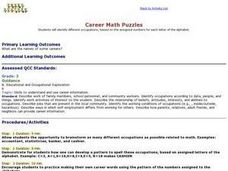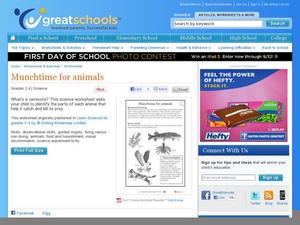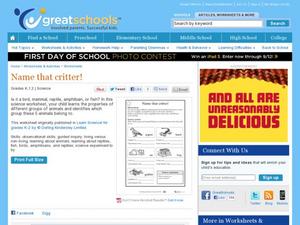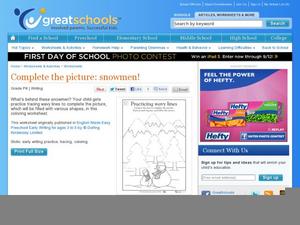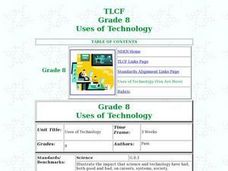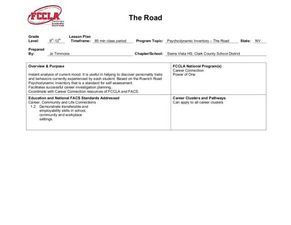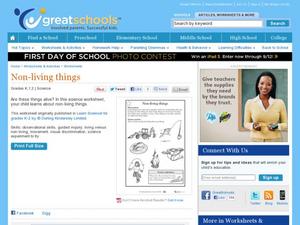Curated OER
Career Math Puzzles
Third graders come up with a career for each letter of the alphabet.
Curated OER
Lowercase and Uppercase #1
Practice with uppercase and lowercase letters using this matching worksheet. There are several letters here and scholars match the ones that make the same sound. The trick is that the matching pairs are between capitals and lowercase...
Curated OER
Match the Words
Even if your kids aren't reading yet, they can become familiar with words by identifying two that are the same. Youngsters focus on the word same as they examine eight words and match them to their identical spellings....
DK Publishing
Real-Life Problems: Miles, Pounds, and More
Give young arithmeticians an applicable way to use their addition and subtraction skills with these five word problems. Each one presents a scenario requiring they add or subtract numbers with units (money, distance, weight,...
Curated OER
Days of the Week
Cover both capitalization and the days of the week with a great kindergarten activity! Kids read each day of the week out loud, then write the name of the day on a line. They answer three questions about certain days of the week,...
Curated OER
Bend It! Stretch It! Squash It!
Some items keep their shape no matter what happens! Have your kindergarten class choose which items would stay the same if they were bent, stretched, or squashed. The last activity prompts kids to see what happens when they stretch a...
Curated OER
Munchtime for animals
Which animals eat meat to stay alive? Third graders group fish, hawks, and cats into carnivores and herbivores. An extended activity prompts kids to cut out magazine pictures of different animals according to the foods that they eat.
Curated OER
Name That Critter
Young learners classify five different animals into their proper category. The animals pictured are a pigeon, a lizard, a cat, a frog, and a goldfish. Pupils are also asked to tell why they know it's a certain kind of animal. An...
Curated OER
My Shadow and Me
Practice making shadows with a kindergarten science experiment. After deciding which picture would represent the biggest shadow, kids use a flashlight to experiment with their own shadows. For extra fun, have kids mark their shadows...
Curated OER
Syllables
How many syllables? This practice worksheet starts with a brief introduction on segmenting words, encouraging kids to say words aloud. They categorize 12 words into lists based on number of syllables: one, two, or...
Curated OER
Multiples of 6 #2
Count by six with these helpful activities. After completing number sequences and multiplication problems from the six times table, third graders solve problems that are written out at the bottom of the page. An excellent way to work on...
Curated OER
Complete the Picture: Snowmen!
Finish the winter wonderland with your preschoolers. They trace pine trees and the tops of mountains to complete the snowy drawing. Have them color their paper and display the drawings during a winter unit!
Curated OER
Contractions
Shorten words with contractions. Second graders use apostrophes to shorten words, including harder ones like might not. Next, they write out the longer versions of various contractions. Have them write a story with these contractions for...
Curated OER
Poems: calligrams
Have fun with shape poems! First and second graders write calligrams that add to the meaning of their poems. Great for your poetry unit or if you want to combine poetry and art lessons.
Curated OER
Getting nosy
A nose knows! Connect animals to their noses with a fun science activity. Animals include elephants, rats, pigs, and even humans. For a science exploration, kindergartners answer questions about what they can smell. A great addition to...
Curated OER
Growing
Growing is part of being a living thing. Kindergartners decide which illustrations represent the life cycle of a living thing, then put a check mark next to the correct pictures. They then examine their own growth on a height chart.
Curated OER
How Light Can "Bend"
Examine the properties of light with a fifth grade science experiment. Pupils find out how light bounces off the surface of a mirror, as well as how a periscope works. For the science investigation part, kids build their own periscope...
Curated OER
Ring-A-Ding-Ding!
What sound does metal make when you hit it? Kindergartners and first graders conduct an experiment about the properties of metal. First, they draw a line between metal items and descriptions of each. Next, they use a magnet to see which...
Curated OER
Technology And Our Quality of Life
Eighth graders design a product or machine and determine the impact their invention has on a person's quality of life. They present their design and machine with a description of its possible impacts to an audience of peers and adults.
Curated OER
The Road
Use psychodynamic theory as a part of analyzing a career cluster.The class defines vocabulary words, brainstorms a list of career traits, and completes an online career analysis inventory. They analyze 5 concepts of psychodynamic...
Curated OER
Social Studies - Guessing Game
Focus on a particular geographic location with this resource. Learners use their social studies textbook to look up information about a specific place. They write down a list of facts and read them to the class. Classmates guess which...
Curated OER
Charity throughout History
Ever stop to think about why charities exist and when they started? Take a second to look through history and discover that giving has been apart of human society since ancient Rome. Jump to the US to uncover facts about our first...
Curated OER
Magnets are forceful
You could use this activity two different ways. As is, or you could have learners actually do the experiment shown. They are to determine which magnet is strongest by counting the number of paper clips hanging from it. Why not get five...
Curated OER
Non-living Things
Very young scientists circle the things on the worksheet that they think are living things. Most of the pictures are of non-living things. A handy worksheet to use during any initial discussion about living vs. non-living things.


